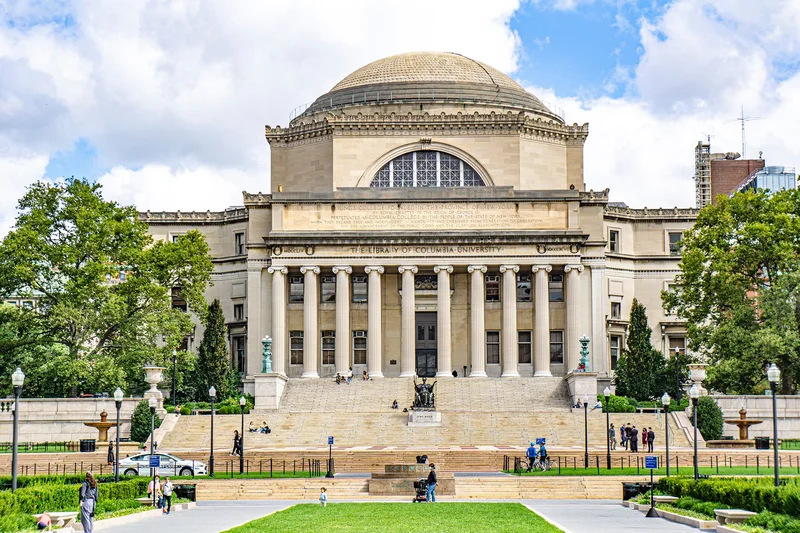Binance Pulse | BNB Price Trends
Binance Pulse | BNB Price Trends
Alright, let's dive into this situation at Columbia University. Congress is pushing them to cut ties with China, citing concerns about CCP influence. On the surface, it's a matter of national security and academic integrity. But underneath, I suspect it's a story about money—specifically, the university's reliance on international student tuition.
Columbia, like many top-tier universities, has a significant international student population. Thirty-nine percent of their student body in 2024 was international, according to their own data. That's a hefty chunk. And those students aren't just there for the intellectual stimulation; they're paying customers. The university relies on international students’ tuition fees to cover roughly 13 percent of its operating costs. Now, 13% might not sound like a lot, but for an institution the size of Columbia, we're talking about serious revenue.
Here's where the China connection becomes relevant. A significant portion of those international students, presumably, come from China. If Columbia caves to Congressional pressure and starts aggressively vetting donors, students, and partners with ties to China, what happens to that revenue stream? Will Chinese students, potentially feeling unwelcome or facing increased scrutiny, choose to go elsewhere?
We already see some indication of this. Columbia is seeing a drop in international student applications for the upcoming admissions cycle. Acting University President Claire Shipman (CC ’86, SIPA ’94) herself raised concerns about this. She said that families and international students might find coming to Columbia "risky," given recent events. And let's be clear, "recent events" likely refers to both increased political tensions and the Trump administration's policies on immigration and visas. According to Shipman, Columbia sees drop in international student applications for upcoming admissions cycle, Shipman says.
The House Select Committee on the Chinese Communist Party is focusing on organizations like the China United States Exchange Foundation (CUSEF), calling it a "united front-linked organization that advances Chinese Communist Party interests." They point out that CUSEF operates in the U.S. to "shape its political environment" and "gain access to advanced foreign technology." Which sounds like a plot from a spy movie, but is probably just aggressive lobbying, if we're honest.
Columbia's embrace of the Greater China Initiative, which includes a trip to Beijing for students, is what triggered this latest round of scrutiny. The trip is sponsored by Columbia’s Chinese partner, the Columbia University Weatherhead East Asian Institute, and cosponsored by CUSEF. So, yeah, it looks bad on paper.

But is it actually a threat? Or is it just a convenient target for politicians looking to score points? I suspect it's a bit of both. There's legitimate concern about foreign influence in academia, but there's also a lot of political theater involved. The challenge for Columbia is navigating this minefield without crippling its finances.
Let's be real: universities are businesses. They need money to operate. And international students, particularly those from wealthy countries like China, are a valuable source of that money. If Columbia cuts ties with China, they risk losing a significant revenue stream. Can they afford to do that? Can they replace that revenue with funding from other sources? Details on how the university intends to address this funding gap remain scarce, but the question hangs heavy in the air.
And this is the part of the report I find genuinely puzzling. Why isn't Columbia pushing back harder against these accusations? Are they worried about something they aren't disclosing? (Perhaps related to donor agreements?) Or do they genuinely believe they can weather this storm without significant financial damage?
It's worth noting that Columbia has already made some concessions. Mahmood Mamdani, a professor at Columbia, mentioned that every department that teaches on Israel and the Middle East is "in receivership" (his word, not mine). A vice provost is reviewing those departments, which Mamdani called "incredible" and "unheard of." He also pointed out that the university now prioritizes free speech outside the gates, rather than academic freedom inside.
Mamdani's comments suggest that Columbia is already feeling the pressure to conform to certain political narratives. If that's the case, cutting ties with China might be the next logical step. But at what cost? Will it compromise academic freedom? Will it damage the university's reputation as a global institution?
Columbia's bet on international revenue streams, especially from China, is looking increasingly risky. The political climate is shifting, and the university is caught in the crossfire. Whether they can navigate this situation without sacrificing their academic integrity or their financial stability remains to be seen. But I suspect it's going to be a bumpy ride.